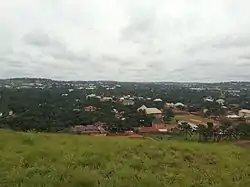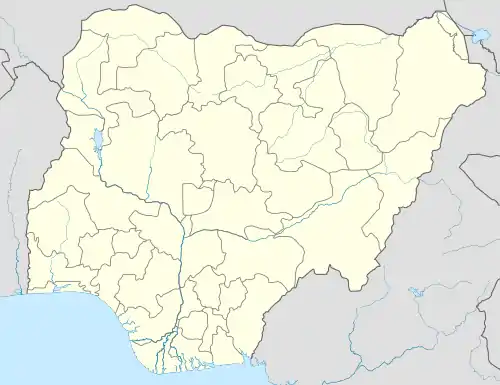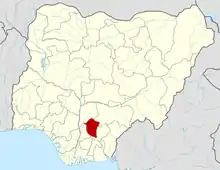Nsukka
Nsukka is a town, Local Government Area and Igbo subgroup in southeast Nigeria in Enugu State. Towns that share a common border with Nsukka, are Edem, Opi (archaeological site), Ede-Oballa, and Obimo. Other nearby towns including Aku and Uzo Uwani now are also referred to as Nsukka, because they fall into the political zoning system in Nigeria known as Senatorial Zone. As an Igbo subgroup, Nsukka covers the whole of Enugu North, Nsukka people are also found in Kogi state. As of 2006, Nsukka had a population of 309,633. Nsukka Town is known as the site of the University of Nigeria, the first indigenous Nigerian university, founded by Late Dr. Nnamdi Azikiwe, first President of Nigeria. Currently the town has a number of Federal Parastatals in the university such as NABDA, CBSS, and the Energy Research Centre.
Nsukka | |
|---|---|
Town | |
 Aerial view of Nsukka from the mountains | |
| Nickname(s): NSK | |
 Nsukka | |
| Coordinates: 6°51′24″N 7°23′45″E | |
| Country | |
| State | Enugu State |
| Area | |
| • Total | 2,141.08 sq mi (5,545.38 km2) |
| Elevation | 1,410 ft (430 m) |
| Population (2006 Census)[1] | |
| • Total | 309,633
|
| Time zone | GMT+1 |
| 3-digit postal code prefix | 410 |
| ISO 3166 code | NG.EN.NS |
| Climate | Aw |
Recognized Traditional Rulers
In Nsukka cultural settings, the following traditional rulers most be observed: Onyishi,Oha/ndi-ishi,Umuada and Igwe.
The LGA
Nsukka LGA has an area of 1,810 km2 and a population of 309,633 at the 2006 census. The Local Government Headquarters is located in the hilly and green sites which Nsukka is known for close to colonial quarters of the pre-Independence years. The current substantive Chairman of Nsukka Local Government is Hon. Barr. Cosmas Ibeziako Ugwueze, the former Deputy Chairman of the council. He succeeded Hon. Patrick Omeje who died in the early hours of Monday, June 15, 2020.
The postal code of the area is 410001 and 410002 respectively referring to University of Nigeria Campus, and Nsukka Urban.[2]
History
Nsukka is home to members of the Igbo ethnic group. Little is known about the history of Nsukka town except that the Kingdom of Nri had contact with Nsukka in earlier periods. However, in the book 'Igbo/Igala Borderland' the ancient American writer traced the origin of Nsukka town to the earlier traders from Arochukwu in the present Abia State, who initially rested and later settled there.
Nsukka's Ancient Wars
Nsukka in the 18th and 19th century had one of the best fighting forces in present-day Enugu-North which they employed in waging war against their neighbours in order to gain more territories for their rising population and for other purposes. Each community that made up the town of Nsukka had stationed in them a fighting force made up of people from that community.
Nsukka's numerous wars with her neighbours were usually successful such that some surrounding communities requested help from Nsukka to protect them from their attackers.[3]
One of such wars Nsukka waged with her neighbours was the war against Ede-Oballa. Nsukka, continuing on its expansionist campaigns annexed a village in Ede-Oballa called Ikeagwu. This war which was led by Arua Ugwoke, a highly revered commander, was halted after Ikeagwu was taken as a result of the death of the commander. He is believed to have mysteriously died after underestimating the powers of a protective charm prepared by Ede-Oballa to help them win the war. His death thus ended Nsukka's advance in Ikeagwu.
Another instance of Nsukka's expansionist bid was the war with Ejuona-Obukpa (a community in Obukpa) which eventually ended in the annexing of a part of Ejuona-Obukpa. According to D. C. Ugwu, this war should not be viewed as one between Nsukka and the entire Obukpa as Ejuona (the involved community) refused the assistance of the rest of Obukpa.[4]
By the time the war ended, Nsukka succeeded in taking parts of Ejuona-Obukpa, almost wiping out one village (Umugboguru) of all its inhabitants in the process.[5]
The Biafran War
In July 1967, Nsukka was one of the first Biafran towns to be captured by the Nigerian forces during their so-called 'police action' at the outset of the Nigerian-Biafran War. This action, during which University of Nigeria, Nsukka was burned down, created many refugees and contributed to the chaos and suffering inherent in this bloody conflict.
According to Benjamin Chinweike Ezema (now called Ezemmah) Nsukka is a town that is made up of three prominent communities, namely the Nkpunanor community, the Ihe n'Owerre community and the Nru Nsukka community. Each of these communities are made of villages headed by an Onyishi (village heads are known as Onyishi) and other title holders. Oral history has it that Nsukka has very close ties with three other neighbouring towns: Obukpa, Okpuje and Eha, which are said to have common ancestral origins. Nsukka, Obukpa, and Okpuje are siblings of Asadu Ideke Arumona; while the last – Eha is a patrilineal brother of the other three relations. The town is therefore called Eha-Alumona. Nsukka town has very ancient culture and traditions that are almost lost in antiquity due to the late awakening of the indigenes to the relevance and necessity of the pursuit of intellectual erudition and research. Each community is composed of many other smaller villages and clans. [6] Prof Roseline Onah is the new chairman of Nsukka local government, who assumed leadership in early January 2016.
Climate
| Climate data for Nsukka | |||||||||||||
|---|---|---|---|---|---|---|---|---|---|---|---|---|---|
| Month | Jan | Feb | Mar | Apr | May | Jun | Jul | Aug | Sep | Oct | Nov | Dec | Year |
| Record high °C (°F) | 36.1 (97.0) |
36.9 (98.4) |
37.8 (100.0) |
36.7 (98.1) |
35.0 (95.0) |
33.3 (91.9) |
35.0 (95.0) |
32.8 (91.0) |
32.8 (91.0) |
34.4 (93.9) |
35.0 (95.0) |
35.6 (96.1) |
37.8 (100.0) |
| Average high °C (°F) | 33.5 (92.3) |
34.9 (94.8) |
34.7 (94.5) |
33.6 (92.5) |
32.0 (89.6) |
30.5 (86.9) |
29.5 (85.1) |
29.6 (85.3) |
30.2 (86.4) |
31.2 (88.2) |
32.6 (90.7) |
32.9 (91.2) |
32.1 (89.8) |
| Daily mean °C (°F) | 25.6 (78.1) |
27.2 (81.0) |
28.3 (82.9) |
27.4 (81.3) |
26.6 (79.9) |
25.5 (77.9) |
25.0 (77.0) |
24.8 (76.6) |
24.8 (76.6) |
25.3 (77.5) |
26.0 (78.8) |
25.6 (78.1) |
26.0 (78.8) |
| Average low °C (°F) | 20.3 (68.5) |
22.8 (73.0) |
23.9 (75.0) |
23.9 (75.0) |
23.1 (73.6) |
22.6 (72.7) |
22.3 (72.1) |
22.3 (72.1) |
22.1 (71.8) |
22.3 (72.1) |
21.6 (70.9) |
20.0 (68.0) |
22.3 (72.1) |
| Record low °C (°F) | 12.8 (55.0) |
12.8 (55.0) |
16.1 (61.0) |
19.4 (66.9) |
19.4 (66.9) |
18.9 (66.0) |
19.4 (66.9) |
18.9 (66.0) |
18.3 (64.9) |
18.9 (66.0) |
14.4 (57.9) |
12.2 (54.0) |
12.2 (54.0) |
| Average precipitation mm (inches) | 18.8 (0.74) |
15.4 (0.61) |
70.3 (2.77) |
130.1 (5.12) |
217.2 (8.55) |
251.9 (9.92) |
241.9 (9.52) |
237.1 (9.33) |
292.0 (11.50) |
200.9 (7.91) |
12.1 (0.48) |
7.7 (0.30) |
1,695.4 (66.75) |
| Average precipitation days (≥ 1.0 mm) | 1.4 | 1.2 | 3.9 | 6.8 | 12.2 | 13.7 | 15.6 | 15.3 | 17.8 | 12.2 | 1.3 | 0.7 | 102.1 |
| Average relative humidity (%) (at 15:00 LST) | 34.3 | 37.4 | 45.6 | 56.4 | 63.6 | 68.5 | 71.3 | 70.8 | 70.3 | 66.4 | 50.5 | 38.7 | 56.1 |
| Mean monthly sunshine hours | 186.0 | 173.6 | 182.9 | 183.0 | 186.0 | 153.0 | 117.8 | 117.8 | 123.0 | 173.6 | 219.0 | 217.0 | 2,032.7 |
| Mean daily sunshine hours | 6.0 | 6.2 | 5.9 | 6.1 | 6.0 | 5.1 | 3.8 | 3.8 | 4.1 | 5.6 | 7.3 | 7.0 | 5.6 |
| Source 1: NOAA[7] | |||||||||||||
| Source 2: Deutscher Wetterdienst (extremes)[8] | |||||||||||||
Secondary education
Nsukka has some of the most recognised educational institutions in south-eastern Nigeria. St. Teresa's College, Nsukka (all boys) is one of the oldest schools in Nsukka and is situated right at the heart of Nsukka township. It is run by the Catholic Church of Nsukka diocese. Queen of the Holy Rosary Secondary School is an all-girls school, also operated by the Catholic Church of Nsukka diocese. Shalom Academy Nsukka (According to Ugwuanyi Okechukwu Emmanuel who graduated from the school years back. he stated that "shalom a private secondary school for both male and female students and the school director is Dr. Willy Onu"). Nsukka High School is a public (government-run) school with Anglican Church heritage. Model Secondary School, Nsukka, is a day school for male and female students. Its Nigerian postal address is: P.O. Box 551, Nsukka. It has Mr. Ezeah as its current principal. St Cyprian's Special Science School Nsukka is an all-science boarding school for girls. There is also the Urban Girls Secondary School, Federal Government Girls' College Lejja Nsukka, the former Lejja Boy's School which a federal government-owned girls' school. University of Nigeria Secondary School belongs to the university and is also top notch. St Catherine Secondary School (all girls) also operated by the catholic church of nsukka diocese and is located very close to the St Teresa's Cathedral Nsukka Diocese. According to the journalist Chuks Isiwu, there is also Government Technical College, Nsukka located in Nguru, one of the four villages in Nkpunanor. Nguru is the traditional head of Nsukka town and therefore the first amongst the villages in Nsukka when it comes to selection or choosing things, including the kola nut.
References
- Federal Republic of Nigeria Official Gazette (15 May 2007). "Legal Notice on Publication of the Details of the Breakdown of the National and State Provisional Totals 2006 Census" (PDF). Retrieved 1 July 2010.
- "Post Offices- with map of LGA". NIPOST. Archived from the original on 7 October 2009. Retrieved 20 October 2009.
- "The Death of Arua Ugwuoke and Nsukka's War with Ede-Ọbara". Ekene Ugwuanyi. 2 August 2020. Retrieved 19 September 2020.
- Ugwu, D. C. (1985). This is Obukpa: The History of a Typical Ancient State. Enugu: Fourth Dimension Publishers. p. 3. ISBN 9789781562884.
- Ozioko, M. A. (2005). Obukpa: Past and Present. Enugu: De-Adroit Innovation. pp. 55–56.
- Renata Adler, "Letter from Biafra", The New Yorker, 4 October 1969.
- "Enugu Climate Normals 1961–1990". National Oceanic and Atmospheric Administration. Retrieved 22 July 2016.
- "Klimatafel von Enugu / Nigeria" (PDF). Baseline climate means (1961–1990) from stations all over the world (in German). Deutscher Wetterdienst. Retrieved 22 July 2016.
